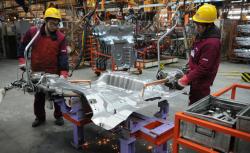Matt,
Hmm, you didn’t take the bait on Bryce Harlow. All right then: globalization.
You’ve described pretty well the trade part of the story. Until the aughts, trade wasn’t much of a contributor to income inequality in the United States because the United States wasn’t doing much trading in manufactured goods with low-income countries. In 1994, Paul Krugman and Robert Z. Lawrence calculated that the average manufacturing wage for countries that traded with the United States was 88 percent of the U.S. average. Now it’s 65 percent. That increases downward pressure on U.S. manufacturing wages (and therefore increases income inequality).
Normally, when a poor country (say, South Korea in the 1980s) starts trading with a rich country like us, you can expect average wages in the poor country to rise rapidly. But when the total population in the poor country exceeds 1 billion, as it does in China, average wages are going to rise a lot more slowly. The embourgeoisement of China’s proletariat may be the inevitable result of its industrialization, but “inevitable” isn’t the same as “speedy.”
The other part of the globalization story is the offshoring of service-sector jobs. Indeed, for the future that may become the main story, since at this point the United States doesn’t have all that many manufacturing jobs left to lose. Service-sector offshoring is kind of a good news/bad news story. To the extent that it displaces trade as a driver of income inequality, its impact won’t be as severe. Less inequality will be created. That’s the good news.
The bad news is why it won’t be as severe: Those distressingly capable workers in Bangalore and elsewhere will be about as likely to compete with highly-skilled labor as with medium-skilled labor. If anything, Princeton economist Alan Blinder thinks service-sector offshoring may hit the affluent slightly harder than the nonaffluent. Blinder wonders, for instance, whether Princeton will want to pay people like him a lot of money to give lectures on economics when it can pay someone standing in front of a TV camera in New Delhi a whole lot less. Business journalists like yourself, I’m sorry to report, are already getting offshored by Reuters. So are some of the stock-market analysts who are often their sources. Don’t tell Slate editor David Plotz!
(I, on the other hand, should be slightly safer, because I write a New Republic column that from time immemorial has been called “TRB From Washington.” If New Republic editor Richard Just ever shortens that to just “TRB,” I’ll start scanning the want ads.)
These gloomy thoughts about the imminent decline of highly-skilled labor in the United States reside entirely in the realm of prediction. Predictions are something I try in the rest of the book to avoid, because they are almost always wrong, and 10 years later you almost always look stupid for making them.
One important countervailing factor concerns whether the affluent, who right now tend to think globalization should proceed unimpeded by vulgar protectionist politics, will retain this principled commitment once it’s them, and not a bunch of blue-collar strangers, whose livelihoods are in peril. A noisy and influential yuppitariat might turn the conventional wisdom protectionist overnight. The liberal economist Dean Baker has had a cackle or two over the prospect of such rank hypocrisy. Should the affluent find a way to get the U.S. government to prevent the offshoring of their jobs, which after all are so very important to the national interest, then globalization’s role in creating income inequality will proceed unimpeded.
Cynically,
Tim
